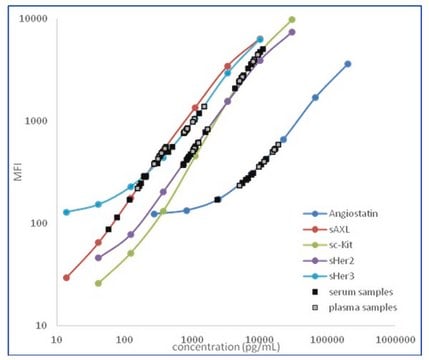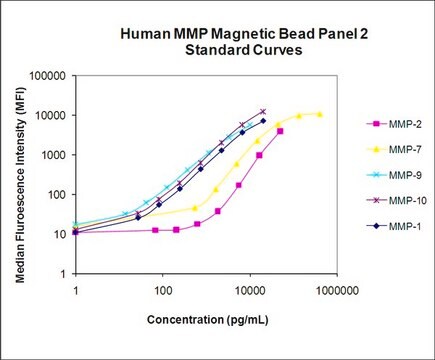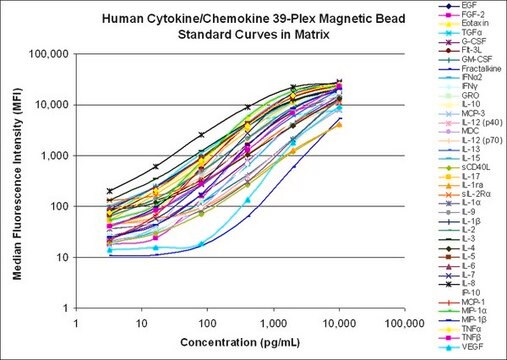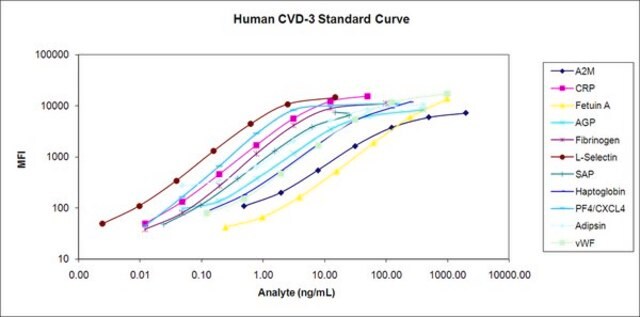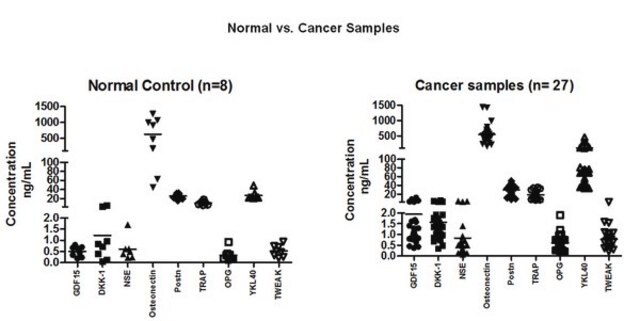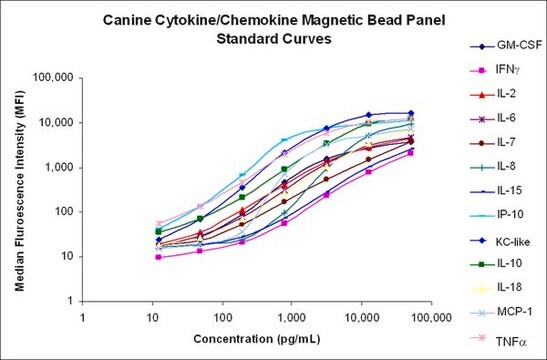HAGP1MAG-12K
MILLIPLEX® Human Angiogenesis/Growth Factor Magnetic Bead Panel - Cancer Multiplex Assay
Angiogenesie Bead-Based Multiplex Assays using the Luminex technology enables the simultaneous analysis of multiple angiogenic biomarkers in human serum, plasma and cell culture samples.
Synonym(s):
human oncology growth factor immunoassay panel, luminex human cancer angiogenesis growth factor multiplex assay, millipore human cancer growth factor protein multiplex kit
About This Item
Recommended Products
Quality Level
species reactivity
human
manufacturer/tradename
Milliplex®
assay range
accuracy: 42-131%
standard curve range: 1.4-1,000 pg/mL
(HB-EGF, IL-8, PLGF)
standard curve range: 13.7-10,000 pg/mL
(Angiopoietin-2, FGF-1, FGF-2, G-CSF, VEGF-A)
standard curve range: 137.2-100,000 pg/mL
(Leptin)
standard curve range: 2.7-2,000 pg/mL
(BMP-9, EGF, Endothelin-1)
standard curve range: 27.4-20,000 pg/mL
(Endoglin, Follistatin, HGF)
standard curve range: 6.9-5,000 pg/mL
(VEGF-C, VEGF-D)
technique(s)
multiplexing: suitable
detection method
fluorometric (Luminex xMAP)
shipped in
wet ice
Related Categories
General description
The MILLIPLEX® Human Angiogenesis / Growth Factor Panel 1 is to be used for the simultaneous quantification of any or all of the following 17 human angiogenesis and growth factor biomarkers in human plasma, serum samples and tissue/cell lysate and culture supernatant samples: Angiopoietin-2, BMP-9, EGF, Endoglin, Endothelin-1, FGF-1 (acidic FGF), FGF-2 (basic FGF), Follistatin, G-CSF, HB-EGF, HGF, IL-8, Leptin, PLGF, VEGF-A, VEGF-C and VEGF-D. This kit uses a 96-well format, contains a lyophilized standard cocktail, two internal assay quality controls and can measure up to 38 samples in duplicate.
The Luminex® xMAP® platform uses a magnetic bead immunoassay format for ideal speed and sensitivity to quantitate multiple analytes simultaneously, dramatically improving productivity while conserving valuable sample volume.
Panel Type: Circulating Cancer
Specificity
Cross-reactivity between the antibodies and any of the other analytes in this panel is non-detectable or negligible.
Application
- Analytes: Angiopoietin-2, BMP-9, EGF, Endoglin, Endothelin-1, FGF-1 (acidic FGF), FGF-2 (basic FGF), Follistatin, G-CSF, HB-EGF, HGF, IL-8, Leptin, PLGF, VEGF-A, VEGF-C, VEGF-D
- Recommended Sample Type: Human serum, plasma, tissue/cell lysate or culture supernatants
- Recommended Sample Dilution: 25 μL per well of a 1:3 dilution of plasma or serum; 25 μL cell culture supernatant per well, diluted with appropriate control medium as needed
- Assay Run Time: Overnight (16-18 hours) at 2-8°C
- Research Category: Cancer
Features and Benefits
Packaging
Storage and Stability
Other Notes
Legal Information
Disclaimer
Signal Word
Danger
Hazard Statements
Precautionary Statements
Hazard Classifications
Acute Tox. 4 Dermal - Acute Tox. 4 Inhalation - Acute Tox. 4 Oral - Aquatic Chronic 2 - Eye Dam. 1 - Skin Sens. 1 - STOT RE 2
Target Organs
Respiratory Tract
Storage Class Code
10 - Combustible liquids
WGK
WGK 3
Certificates of Analysis (COA)
Search for Certificates of Analysis (COA) by entering the products Lot/Batch Number. Lot and Batch Numbers can be found on a product’s label following the words ‘Lot’ or ‘Batch’.
Already Own This Product?
Find documentation for the products that you have recently purchased in the Document Library.
Our team of scientists has experience in all areas of research including Life Science, Material Science, Chemical Synthesis, Chromatography, Analytical and many others.
Contact Technical Service